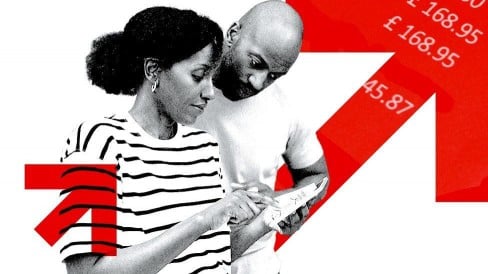
Annual energy bills are falling in October, but prices remain much higher than in recent years.
Some of those struggling to pay have been forced onto more expensive prepayment meters, prompting energy regulator Ofgem to strengthen rules to protect consumers.
What is happening to energy bills?
The government launched its Energy Price Guarantee in October 2022. It replaced the previous Ofgem energy price cap, and limited a typical dual-fuel household's annual energy bill to £2,500.
This remained in place until the end of June 2023, when the Ofgem cap was reinstated, at which point a typical annual energy bill fell to £2,074.
Under the latest price cap, typical annual bills will fall to around £1,923 between October and December.
What happens if you don't pay your bill?
If you don't agree a payment plan with your supplier, they might try to force you to have prepayment meter installed, or they may switch an existing smart meter to prepayment mode.
In very rare cases, if you haven't paid a bill after 28 days, you might be threatened with disconnection, but you'll normally be offered a meter first.
If you've reached state pension age, your supplier can't disconnect you between 1 October and 31 March if you either:
- live alone
- live only with pensioners, or under-18s
Suppliers can pass your details to a debt collection agency - and you might be charged more to cover the cost of this.
Many suppliers also charge extra fees for late payments.
Paying by direct debit is normally the cheapest way to pay for electricity and gas. Cancelling a direct debit means future bills are likely to be higher.
Non-payment could also damage your credit rating, and make it harder to borrow money.
Image source, Getty Images
What are the rules about prepayment meters?
The regulator Ofgem reviewed the use of prepayment meters after an investigation by The Times found debt agents acting for British Gas wrongly broke into vulnerable people's homes to fit meters.
In addition meters cannot be fitted for:
- customers over 85, without someone else in the house, or anyone with a terminal illness
- those with health conditions which could be worsened by living in a cold home, such as chronic bronchitis, emphysema and sickle cell disease
- those who need a continuous energy supply for health reasons
- households where no one can top up the meter due to physical or mental incapacity
Those forced onto a prepayment meter will get £30 initial credit to reduce the risk of them losing supply.
The government has said prepayment energy charges will be cut, bringing them in line with direct debit rates.
Suppliers have also been told to identify households where meters were wrongfully installed, return the customer to their previous tariff and offer compensation.
What should you do if you can't afford your bills?
Check your direct debit
Your monthly payment is based on your estimated energy use for the year, and your supplier may reduce your bill if its estimate is higher than the amount you actually use.
You can also request a flexible monthly direct debit where you only pay for your actual consumption. This requires a smart meter or regular readings.
However, two-thirds of gas usage is during the winter months, so make sure you understand the impact of reducing payments during warmer weather.
Pay what you can
If the direct debit is fair, but you can't meet it, ask your supplier for an "able to pay plan" based on what you can afford.
By paying something every month - even if it's less than the amount due - your arrears grow more slowly, and your supplier may be less worried about your debt.
You may be able to get your name added to the Priority Services Register (PSR), a list of households entitled to extra support.
Those eligible include pensioners, pregnant women, parents of young children, and people who are disabled.
Ofgem also recommends asking your supplier to add your name to the Network Operator Register, if you rely on your energy supply for medical reasons.
If you have different gas and electricity suppliers, you need to contact them both.
Being on the PSR doesn't cancel your arrears. But it does show that you are vulnerable, which your supplier should take into account.
Claim any relevant benefits
The independent MoneyHelper website has a useful guide to available benefits, while Policy in Practice and the charities Entitledto and Turn2us run benefits calculators.
You may also be able to repay your debt directly from your benefits through the government's Fuel Direct scheme.
A number of suppliers and charities also offer hardship grants.
Check you're getting extra government help
The next payments for some eligible groups will be made between 31 October and 19 November.
Adjust your boiler
If you have a combi boiler at home - you don't have a hot water cylinder and there is a (usually white) plastic pipe under the boiler - you may wish to consider turning down the heating flow temperature.
On the front - sometimes behind a flap - look for a dial or set of buttons with a radiator icon. Turn the dial to the number three, or the 12 o'clock position. If it has a digital display, select 60C.
You may also want to turn off the hot water pre-heat. Many boilers come on every few hours - night and day - to ensure there's always some hot water available.
Most homes don't need this, and turning it off saves money.


